For the Love of Sourdough! Starting a Sourdough Adventure
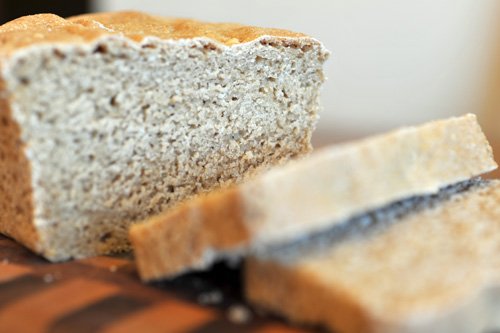
Written by Stacey Taggart, Contributing Writer
My love for sourdough began on our honeymoon when my husband and I explored San Francisco. I have bought it as often as I could since then, enjoying it every single time.
Not too long ago, I learned I could make my own sourdough at home! At first, I was both fascinated and intimidated. Thankfully, my curiosity won over and our sourdough adventure began!
I still find sourdough to be completely fascinating and I shouldn’t have felt intimidated – I have found it to be more forgiving and much simpler than I imagined. And although I still have so much to learn, it’s been a fun and tasty adventure!
What is sourdough?
“Sourdough is nothing more than flour and water with wild yeasts to make it rise and special bacteria to provide the flavor.” – Ed Wood, World Sourdoughs From Antiquity
Sourdough might be considered one of the oldest traditional foods. Ancient bakers discovered long ago that their breads and cakes could be leavened using wild yeasts and friendly bacteria.
Many people don’t know that the typical bakers yeast we purchase at the grocery store today is relatively new. Commercial bakers yeast wasn’t contrived until the late 1800s, yet our ancestors have been leavening bread naturally for more than fifty centuries.
As a result of its tangy and distinctive flavor, naturally leavened bread in America became known as “Sourdough” during the days of California Gold Rush, also coincidentally during the late 1800s. From then on, naturally leavened bread has been known as sourdough.
How does it work?
If your child needs a science fair project, consider sourdough! It’s actually a very cool process…
Without going into too much science and detail, here’s how it works:
- In a healthy sourdough starter, the yeasts and bacteria live harmoniously in a mutually beneficial relationship. Interestingly, the yeasts help feed the bacteria which, in turn, create an acidic environment in which the yeasts thrive.
- The wild yeast creates enzymes which eat up, or predigest, the starches and sugars in the grain. As they do this, the enzymes release carbon dioxide, which gets trapped in tiny air pockets within the dough and causes the dough to rise.
- The bacteria also help the bread to rise by a similar process, but in addition, the bacteria produce acids which give the dough its complex flavor and beloved tanginess.
The Health Benefits of Sourdough
When I fell in love with sourdough several years ago, I had no idea of the health benefits. Now I know that it’s not only good, it’s good for you, much better in fact that typical yeast-risen bread.
-
Digestibility
The enzymes created by the yeasts predigest starches and sugars and break down gluten which makes it more digestible and easier on the gut. Given the long fermenting and rising times necessary for sourdough, many who have food sensitivities to grains and gluten are able to tolerate sourdough much more easily. In addition, the fermentation process increases the amount of beneficial bacteria which aid in digestion and elimination.
-
Nutritional Advantages
Beneficial bacteria are able to take advantage of the longer leavening time in order to break down phytic acid. Phytic acid, found in all grains, seeds and beans, is known as an anti-nutrient because it actually strips the body of necessary minerals. When the phytic acid is disabled, our bodies are able to take full advantage of the nutrition we are consuming.
-
Lower glycaemic index
As the bacteria eat at the starches and sugars in the grain, it lowers the carbohydrate content of the bread. Sourdough bread is rated 68 on the glycaemic index whereas other types of breads rate around 100. This helps control blood sugar levels, preventing troublesome spikes and dips.
-
Essential Minerals and Trace Elements
Sourdough which is made from whole grain flour provides essential minerals and trace elements such as iron, zinc, copper, manganese, calcium and phosphorous. Unlike bread made with bakers yeast the unique fermentation process of sourdough makes these minerals and elements much more readily available for the body to absorb and assimilate.
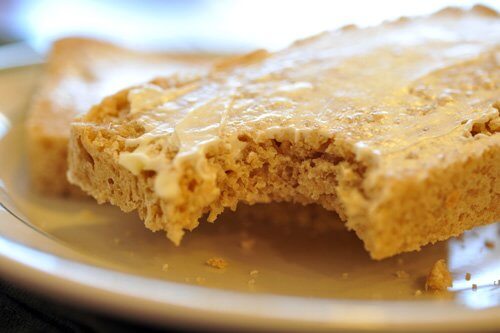
Using Sourdough
The possibilities are endless when incorporating sourdough into your real food diet! Practically any bread or dough recipe can be altered using sourdough methods rather than using commercial yeasts.
Give some of these recipes a try:
Sourdough Pancakes
Whole Grain Sourdough Bread
Simple, Affordable (Sourdough) Bread
Sourdough Pizza Crust
4 No-Wait Sourdough Recipes (Impossible Pie, Pancakes, Waffles and Crepes)
Sourdough Cinnamon Rolls with Buttermilk Cream Cheese Icing
Sourdough Deep Dish Pizza
Sourdough Blueberry Muffins with Crumb Topping
Erin’s Sourdough English Muffins
Sourdough Chocolate Chip Cookies
Sourdough Biscuits
Sourdough Chocolate Cake with Natural Powdered Sugar Frosting
Getting Started:
Getting, maintaining and using a sourdough starter isn’t difficult, but it is a process that takes some time to become familiar with. Like most traditional and real foods, it’s different than what we’re accustomed to and so, while it may seem foreign at first, you’ll soon fall into a routine and become comfortable with sourdough and how it works and reacts.
I could share what I have done and what I do with my sourdough, but being so new at it myself, I think it would be best to learn from the experts. 🙂
Wardeh from GNOWFGLINS (God’s Natural, Organic, Whole Food, Grown Locally, In Season) and her friends definitely know their sourdough and that’s how I learned and got started.
She offers a Sourdough eCourse that teaches everything from obtaining and maintaining a sourdough starter, to using that starter to create a wide variety of delicious and wonderful dishes. The course teaches you to make much more than just great sourdough bread, although she’ll definitely teach you how to do that too! (Stephanie reviewed and recommended the eCourse last fall).
In addition, Wardeh recently released a new ebook Sourdough From A to Z with simple lessons and tasty recipes as a companion to the eCourse. If you missed the giveaway earlier in the week, don’t worry, you can still get a copy of the ebook as recommended by Stephanie.
Good luck as you embark on your own sourdough adventure! I think you’ll really enjoy it, as will your family when they get to taste all your creations which are not only yummy, but good for them too!

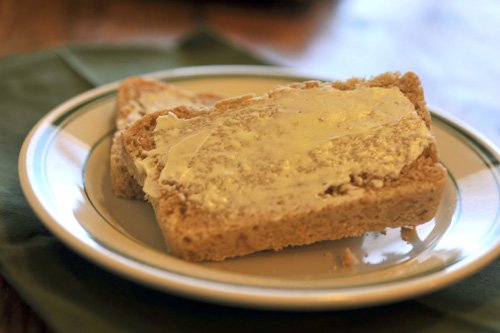
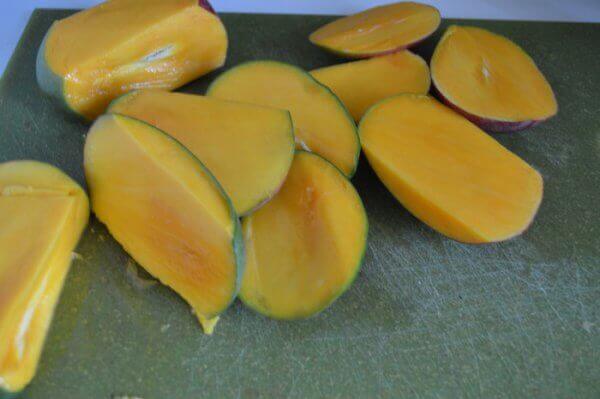
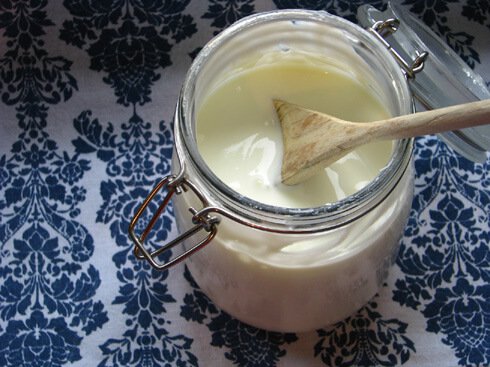
That looks really good. Thanks for the insight – I had never realized that there were so many benefits to eating sourdough!
I am encouraged to try making a sourdough bread. I have been putting it off. But now knowing the difference from regular bread…. I am definetly going to give it a try.
We need to eat gluten-free, but I’d like to use sour dough. Any ideas on how to get a GF starter?
@Dee Jarvis, I don’t personally know how (although I really want to learn), but I know that the Sourdough A to Z eBook linked to in the post includes detailed instructions for making and using a GF starter.
@Dee Jarvis,
you can order a brown rice sourdough starter from Culture’s for Health. here’s the link: http://www.culturesforhealth.com/starter-cultures/sourdough-starter/brown-rice-sourdough-starter.html
as Stephanie said, the Sourdough A to Z book would be a great reference. Wardeh says on the ebooks webpage, “While the major focus of this eBook is not gluten-free, this eBook contains notes on starting, keeping and maintaining a gluten-free starter, as well as all gluten-free adaptations of the major recipes in the eBook.”
good luck with the gluten-free starter! i know they’ll be many interested to know how you like it. 🙂
I love sourdough. And while I have been making my own bread for just over two years. And though I have a lovely recipe, I Have been disatisfied because of the knowledge that there is a healthier bread option. But, I also have been intimidated to try making my own sourdough. I ony recently learned about the benefit of making your own sourdough starter. I’m pleased to learn about the health benefits of eating sourdough. Thanks for the resources I had no idea where to even start looking.
@Rita, I was intimidated because the process of sourdough seemed so foreign to me. But I’ve found that the more I work with it, the more and more comfortable I feel. I’ve made some mistakes, sure, but my husband and I get a good chuckle and then I move on to the next project. 🙂
I am hoping to learn how to make sourdough soon. I have a starter and everything. I think I am a little intimidated. I don’t want to mess up.
@Mona @ Healthy Homesteading, Even the mess ups are still usually edible. 🙂 Try something like pancakes to feel super successful the first time!
I have been using sourdough for about a year now, and love it! I made sourdough english muffins this morning, just took my last batch of sourdough parmesan/basil crackers out of the oven, and am about to mix up some sourdough pizza for tonights supper. Once you get a feel for it, you can experiment with lots of different traditional recipes.
@FarmgirlCyn (Cindy),
oohh- could you share your recipe for the crackers? that sounds delicious!
I am experimenting with a gluten free sourdough- I have an old, (60 years) well-tested sourdough that I am trying to convert to gluten free- right now I am just using an expensive GF flour mix from the store b/c I was worried about ruining the sourdough. If it works for the first few batches, I may gradually progress into something less expensive that I can grind myself. Will let you know how it goes!
(ps- the friend who gave me the starter has the rest- don’t worry, I am not going to destroy a lovely, decades-tended, sourdough:-)
I am a kindred spirit on the love of sourdough! I learned to make it while healing from a terrible bout with crohn’s disease 8 years ago. The digestibility of sourdough cannot even compare to that of commercial yeast. I have also made my bread for a family that has a child with a neurological disorder on the autism spectrum. Gluten is a no-no for them, but I asked if they would be willing to try whole wheat sourdough that had been allowed to ferment for 24hrs. (I do this in a controlled temperature environment otherwise the bread would be terrible!) The mother was so ecstatic that the bread worked perfectly for their son. Better, in fact, than the gluten free bread she had been giving him! Imagine that! I’m not saying it would work for everyone, of course, but it was an amazing result. Love love love sourdough!
@Tammy, That’s so encouraging for me to hear. I want to learn more about the controlled temperature for long ferments. That’s what I’m trying to figure out right now. My family doesn’t like it when the bread ends up too sour, but I want a really long ferment, especially for my two youngest.
@Tammy, I’d love to hear more about the controlled-temp environment, too…interesting! I love a tangy sourdough…
I am a recent concert to traditional foods and started doing sourdough by experimentation before finally signing up for the ecourse. Their tips are fantastic! The starter sat on my fridge not doing much before, but now I use it regularly. My current bread schedule is to build up the starter at dinner time, mix the dough before bed, put it in pans the next morning, and have it baking by lunch. Piece of cake once you have a rhythm down! 🙂
If you are intimidated by the whole new idea of making sourdough bread, start with sourdough pancakes. Once you have your starter going, you need to feed it each week (or more) so that is when I plan pancakes.
They are simple. Just a ferment overnight.
@Jenny in CG, great tip jenny!
I love sourdough bread and I’ve been thrilled to find out just how healthy it is for you. I think today is a good day to make my own starter. 🙂
p.s. I’ve left a little something for you on my blog!
http://coffeeandcaramel-bobbey.blogspot.com/2011/04/feeling-very-stylish.html
i want to start baking with sour dough – it is my favorite type of bread but i don’t have a starter yet. it is so good it is addicting!
@charis, and now even more addicting because you know it’s good for you too! at least that’s what happened to me! 🙂
We bought some sourdough bread recently from a health food store. It was very expensive, but tasted great.
I haven’t done much baking lately, but one day I will try to make this myself. Thanks for all the information!
Thank you so much for your info and super easy to follow instructions on making your own Sourdoah Starter 🙂 I just made mine tonight! 🙂 Im really hoping that it works out. This will be my first experiance in bread making. If this works out. I will never eat any other bread considering all the benefits of sourdoah and the fact that in the past year or 2 i have noticed ive been having a really hard time digesting wheat and gluten. I hope that this helps. Thanks again.